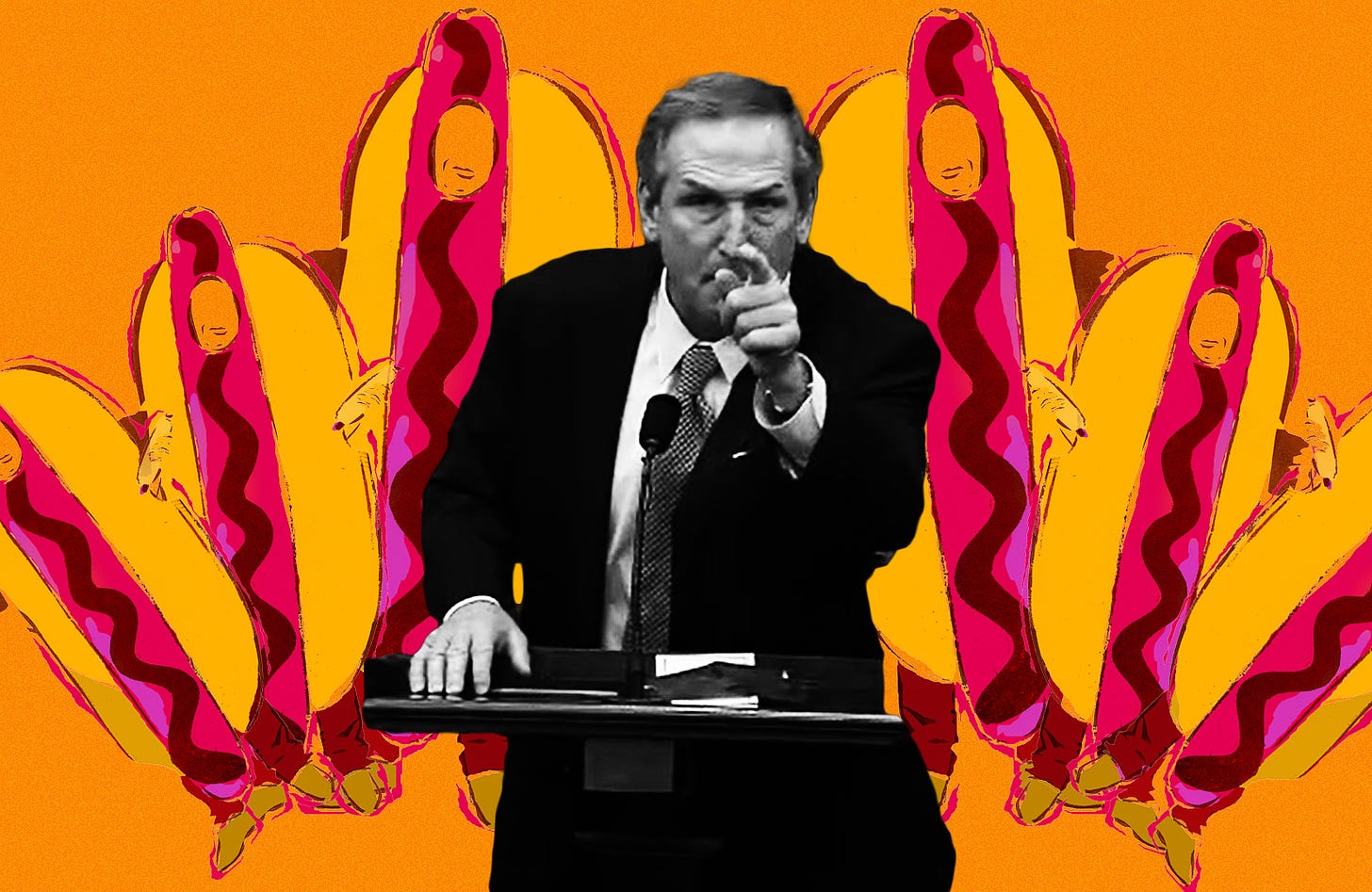
The 10 Worst Moments from Trump’s “Defense”
The former president got the impeachment defense he deserved.

Donald Trump’s lawyers took only about three and a half hours to make their case in defense of the “45th president”—aka the former president. (More on that in a moment.) They used less than a quarter of the 16 hours the Senate procedural agreement had afforded them. And the truth is, they could have used even less time if not for the fact that Trump lawyer Michael van der Veen spoke . . . very . . . slowly. It was the equivalent of a high school student filing a 20 page paper in 14-point, double-spaced Courier.
But the padded-out length of the defense was just one unspoken acknowledgment by Trump’s lawyers of how weak their case was. There were, by my count, at least 10 others.
(1) The Trump team couldn’t agree on exactly what the status of their client was. Bruce Castor, who was the team leader, insisted on referring to Trump as the “45th president,” a convenient way of eliding the question of whether or not Trump should be rightfully considered the loser of the 2020 election. (The Trump team first adopted this appellation in its brief earlier this week.)
At the same time, Trump’s team also argued that for the Senate to disqualify Trump from office based on incitement to insurrection would be an unconstitutional infringement of the free speech rights of a “private citizen.”
Trump can’t have it both ways.
(2) By refusing to acknowledge that their client is the former president, the defense team actually furthered Trump’s Big Lie about the election not being free, fair, trustworthy, and conclusive. Their client still claims to have won the 2020 election—which he lost by 7 million votes—by a landslide. The defense team said nothing to contradict this claim and debunk Trump’s lie.
But not only did Trump’s lawyers not debunk his lie, they actually furthered it in the course of making their defense!
In their brief discussion of Trump’s infamous phone call with Georgia secretary of state Brad Raffensperger, Castor implied that there was a reason to believe the election results in Georgia were suspect. “Based on an analysis of publicly available voter data,” Castor said, “the ballot rejection rate in Georgia in 2016 was approximately 6.42 percent. And even though a tremendous amount of new, first-time-mail in ballots were included in the 2020 count, the Georgia rejection rate in 2020 was a mere 0.4 percent."
Which is incorrect.
Georgia election official Gabriel Sterling explains why these numbers are so much bunkum.

(3) Multiple members of “the 45th president’s” legal team decried “hatred” in politics.
By which they meant the hatred Democrats have for Trump, which they claim was the motivation for this second impeachment.
Trump’s lawyers did not see “hatred” as the motivation that led people to destroy public property, disrupt congressional proceedings, erect gallows, and attack and murder police officers on January 6.
This insane view didn’t even rise to the level of false equivalence.
(4) At one point, van der Veen looked directly toward the House impeachment managers and claimed, “Either words matter or they don’t.” He should take his own advice.
Van der Veen also suggested to the Senate that convicting Trump because of his speech would be a violation of the former—sorry, 45th president’s free speech rights. He even read the First Amendment aloud: “Congress shall make no law…”
But of course impeachment isn’t a law. Either words matter or they don’t.
(5) Van der Veen went on to suggest that to violate Trump’s rights in such a brazen manner (bear with me here) would somehow be a violation of the senators’ oaths.
Yes, you read that right.
A lawyer defending Donald Trump thought it was a good idea to bring up violation of oaths of office as a reason to acquit the former president who incited an insurrection against the U.S. government.
(6) Trump’s lawyers compiled a video of Democrats suggesting that various electoral results were illegitimate—Stacey Abrams refusing to concede her race for Georgia governor, Hillary Clinton suggesting that Trump knew Russian interference tipped the scales in his favor, etc. If raising doubts about the outcome of an election is tantamount to insurrection, they asked, why hadn’t Abrams and Clinton been brought up on charges?
One reason is that the trial in question is an impeachment trial, not a criminal trial. Another reason is that, even in a criminal trial, “She started it” is not a valid defense.
But the most obvious reason is this: No one argued that Trump’s incitement was just because he refused to concede the election. Instead, the House impeachment managers spent about 12 hours explaining how the incitement was a months-long process that began before the election, continued after the election, and culminated with Trump summoning a mob on January 6 and then literally directing them to march on the Capitol with the goal of preventing the counting of the Electoral College votes.
(7) Throughout the entire proceeding, the defense invoked principles, rules, and standards that apply in courtrooms. They inveighed against the lower standards for evidence in the Senate trial compared to a courtroom. They cited case law about criminalized speech and prior restraint as if they were controlling precedents. Van der Veen even told the Senate that their job was to interpret the law and apply it to the facts at hand.
All of which is wrong. That’s what courts do. These lawyers were talking to the U.S. Senate. To suggest that the two bodies have the same job—or that the rules made by courts should restrict the Senate—isn’t just constitutionally illiterate. It’s inviting a violation of the separation of powers. The Senate, not the Supreme Court, is given the sole power to try impeachments.
(8) Upon miraculously rediscovering that they were addressing the Senate, and not a court, the defense team indulged in some good ol’-fashioned stump speechifying. They inveighed against the naked, unapologetic, shameless quest by the House managers to get the Senate to disqualify Trump from running for office again.
As if that wasn’t exactly what the Constitution allows in the black letter of the law.
(9) The most substantive contention from Trump’s defense was that he called for “peace” repeatedly on January 6. He called for peace in his speech that morning! He called for peace in some tweets later that day! Words matter!
During the question and answer phase after Trump’s defense rested, lead House manager Rep. Jamie Raskin delivered a fitting rejoinder: “If you rob a bank, and on the way out the door you yell, ‘Respect private property!’ that’s not a defense to robbing the bank.”
(10) As the hours dragged on, van der Veen didn’t continue his plodding pace. He became more and more agitated, growing red in the face, and during the question and answer period, began gesticulating with his arms and hopping in front of the microphone. Before the eyes of 100 senators, the lawyer took on the affect of his client.
The transformation was complete when van der Veen addressed the letter signed by 144 constitutional lawyers refuting his arguments. It was, he intoned, not just a disagreement over law, but a personal attack on him, an effort to intimidate him and silence him.
He, Michael van der Veen, was the real victim of the January 6 assault and the impeachment that followed.
It was the most Trumpian moment of the entire trial. A late-middle-aged, white lawyer, who, despite specializing in dog-bite cases, accepted this high-profile (and probably remunerative) job, was given the honor of addressing the United States Senate—and used his time to complain to America that he was a victim.
It was a fitting final act for the Trump era.











